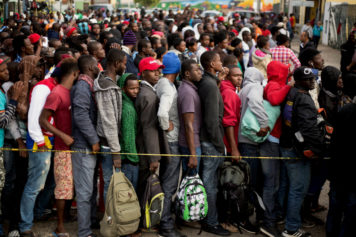The governments of Haiti and the Dominican Republic are set to hold the second round of talks in Jimani on Monday, but this time without the immigration issue on the agenda.
A whirlwind of debate was created recently after a Dominican Republic ruling which, once implemented, will strip tens of thousands of Dominicans of Haitian descent of their citizenship and put them in a limbo of statelessness. The ruling is being condemned as racist and inhumane by human rights groups.
César Dargam, deputy foreign minister for economic affairs, said the commissioners from the two countries will deal with the issues of trade, agriculture and the environment.
During the first meeting held at Ouanaminthe, Haiti, on Jan. 7, the two states had agreed not to include the immigration issue, and would continue addressing it in a second meeting.
In the meantime, the issue remains a hotly debated topic. Human rights advocate Peter Flegel opines in a piece titled Dominican Republic: Justifying the unjustifiable :
“The constitutional court decision to strip thousands of Dominicans of Haitian descent of their citizenship has unleashed a flurry of commentary both inside and outside the Caribbean nation.
“Some like Dominican-American author Diaz Junot, and an array of Latin American human rights groups, are speaking out against the ruling. Citing international and regional human rights norms, they condemn what they consider a fundamentally racist and inhumane decision. Others, including a phalanx of Dominican intellectuals and government officials, have applauded the ruling, claiming it provides an effective legal framework to address serious threats to the country’s territorial integrity.
“One such supporter is Dominican “scientific researcher” Virgilio Rodriguez. In his December 14, Al Jazeera opinion piece, “Erroneous Objections to the Dominican Constitutional Ruling on Citizenship,” Rodriguez lays out what he dubs a “non-racial” case in favor of the court’s decision. Despite his best intentions, however, the researcher’s arguments suggest that race is at the very core of the controversial ruling.
“Rodriguez kicks-off his commentary by delving into the constitutionality of the court’s decision. The case is a clear one, he avers. Since 1929, successive Dominican constitutions have specified that people born on Dominican soil to foreign parents in transit cannot be granted citizenship. Moreover, the Dominican courts have ruled that children of illegal immigrants are also ineligible for Dominican citizenship, for reasons of ‘consistency.’
“Rodriguez continues by citing the U.S. Center for Immigration Studies – an anti-immigration lobby group according to the Southern Poverty Law Center- to claim that 145 of the world’s 194 countries do not apportion citizenship to children born of illegal immigrants. Therefore, he concludes, the Dominican Republic was on firm legal footing, when its constitutional court elected to render stateless tens of thousands of Dominicans of Haitian origin.
“Case closed? Not quite. For, a cursory review of international and regional jurisprudence on the matter suggests that the ruling is far less ‘constitutional’ than the researcher would have us believe.
“In the 2005 case, the Inter-American Court of Human Rights ruled that the Dominican government violated international and regional law, as well as its own constitution, when it refused to grant nationality and education to Dominican-born children of Haitian descent. The regional human rights body revealed that since at least 1939, Dominican law has defined people in transit as foreigners entering the country principally to travel elsewhere, as tourists, as members of foreign forces, or as temporary workers and their families. Based on that very definition, the Inter-American Court reasoned that Dominican-born people of Haitian descent, and those Haitians who have resided in the country for several years, cannot be considered ‘in transit.’ It ordered the Dominican government to provide nationality cards to the plaintiffs and any other children in a similar predicament.
“Given the Dominican Republic is signatory to a variety of international and regional human rights conventions, it is puzzling that these considerations are not even alluded to in Rodriguez’s opinion piece. It would appear that the salience of regional court rulings and international human rights norms are of little interest to the researcher. By his own admission, he is far more concerned about what, in his view, is the gravest threat to his country: Haitian immigrants and their Dominican-born children.
“Rodriguez waxes apocalyptic about this danger by warning that ‘masses of Haitians’ could soon occupy ‘large portions of the DR.’ Worse yet, they may even gain ‘political control over the Dominican Republic through their Dominican-born children.’ Therein, he claims, lays, ‘the strongest argument in favor of the Dominican constitutional court’s ruling.'”
Read the full story at america.aljazeera.com


